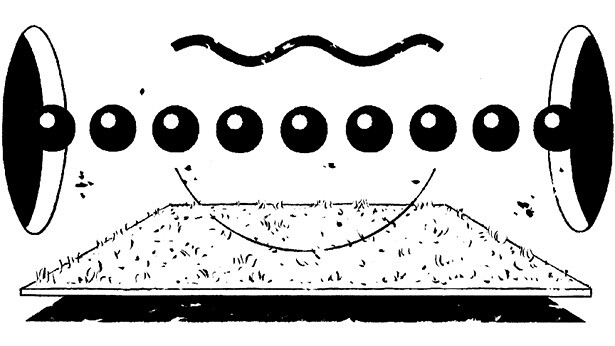Model course, presentations and discussions
November 14–22, 2014
Haus der Kulturen der Welt
John-Foster-Dulles-Allee 10
10557 Berlin
Germany
www.hkw.de/en/campus
Twitter / #AnthropoceneCampus
How does the Anthropocene change our approach to the world? How does a new, “Earthbound” knowledge emerge; what knowledge is relevant? How should institutions and procedures be structured where such knowledge is to be generated and imparted?
Haus der Kulturen der Welt in cooperation with the Max Planck Institute for the History of Science invites the public to address these questions together with international scientists, artists, and actors from the fields of educational and environmental policymaking on the occasion of the Anthropocene Campus. This experimental model course and forum of exchange explores pathways towards a new transdisciplinary culture of knowledge production and education.
As one of the core projects of the large-scale Anthropocene Project 2013/2014, thirty researchers and university teachers from the natural sciences and humanities, as well as art, architecture and design have developed an Anthropocene Curriculum in interdisciplinary collaboration. Their general aim is to formulate modes and contents of a corpus of knowledge that is re-attached to our “earthbound situation” and helps to readjust the human position within a broader geo-fabric.
During the Anthropocene Campus this curriculum is put into teaching practice for the first time with a selected group of 100 international young researchers, artists, and cultural producers. A vivid public program widens this temporary faculty towards a broader forum of debate on contents and forms of teaching and learning in the Anthropocene.
Starting with concrete case studies, highlighting the real-world challenges that question the institutionalized disciplines and educational formats (Friday, November 14 & Saturday, November 15), and proceeding with interventions by artistic researchers in the form of multimedia presentations and artist talks (Saturday, November 15; Monday, November 17; Wednesday, November 19), the Campus draws to a close with an open hearing. “Earthbound Knowledge: A forum. Co-Producing a curriculum for the Anthropocene” brings together all Campus participants with guests from the fields of education, research, and policymaking for a series of table talks and discussions. Up for debate are the public organization of knowledge, its accessibility and its experimental foundations, as well as the means of working with uncertainties, initializing negotiations of key concepts and methods for the dynamic generation of knowledge forms and modes of education yet to come (Friday, November 21 & Saturday, November 22).
Head of project: Katrin Klingan (HKW)
Scientific concept: Christoph Rosol (Max Planck Institute for the History of Science/HKW)
Scientific advice, moderation: Roman Brinzanik (Max Planck Institute for Molecular Genetics)
The Anthropocene Curriculum is developed by:
Marco Armiero (environmental historian and political ecologist, Stockholm), Amita Baviskar (sociologist, Delhi), Elena Bougleux (cultural anthropologist, Bergamo), Arno Brandlhuber (architect, Berlin), Miriam Diamond (environmental scientist and chemist, Toronto), Paul N. Edwards (historian of information technology and climate science, Michigan), Erle Ellis (landscape ecologist, Baltimore), Sabine Höhler (physicist and historian of science, technology, and environment, Stockholm), Pablo Jensen (physicist, Lyon), Natalie Jeremijenko (artist, natural scientist, and experimental designer, New York), Adrian Lahoud (architect and historian of urban design, London), Manfred D. Laubichler (biologist and historian of science, Arizona), Mark Lawrence (atmospheric scientist, Potsdam), Reinhold Leinfelder (geologist, Munich/Berlin), Wolfgang Lucht (physicist and Earth system scientist, Potsdam), Ioan Negrutiu (biologist, Lyon), Philipp Oswalt (architect, architecture and design theorist, and writer, Kassel), Armin Reller (resource strategist, Augsburg), Jürgen Renn (physicist and science historian, Berlin), Libby Robin (historian of science and environment, Stockholm), Wolfgang Schäffner (historian of media technologies, Berlin), Sverker Sörlin (environmental historian, Stockholm), Will Steffen (Earth system scientist, Canberra), Bronislaw Szerszynski, (sociologist, Lancaster,) Helmuth Trischler, (historian of science and technology, Munich), Eyal Weizman (architect and visual cultures theorist, London), Jan Zalasiewicz (geologist, Leicester)
Guests public program:
Armin Linke (artist, photographer, and filmmaker, Berlin), Chip Lord (media artist, Santa Cruz), The Otolith Group (artist collective, founded by Anjalika Sagar and Kodwo Eshun, London), Andrew Pickering (science and technology historian, Exeter), Territorial Agency (John Palmesino and Ann-Sofi Rönnskog, architects and urbanists, London), Rifka Weehuizen (science management and science policy expert, Strasbourg)
Press contact
Anne Maier, Haus der Kulturen der Welt: [email protected] / T +49 (0) 30 39787153
The Anthropocene Curriculum is a part of The Anthropocene Project and is being developed by:



